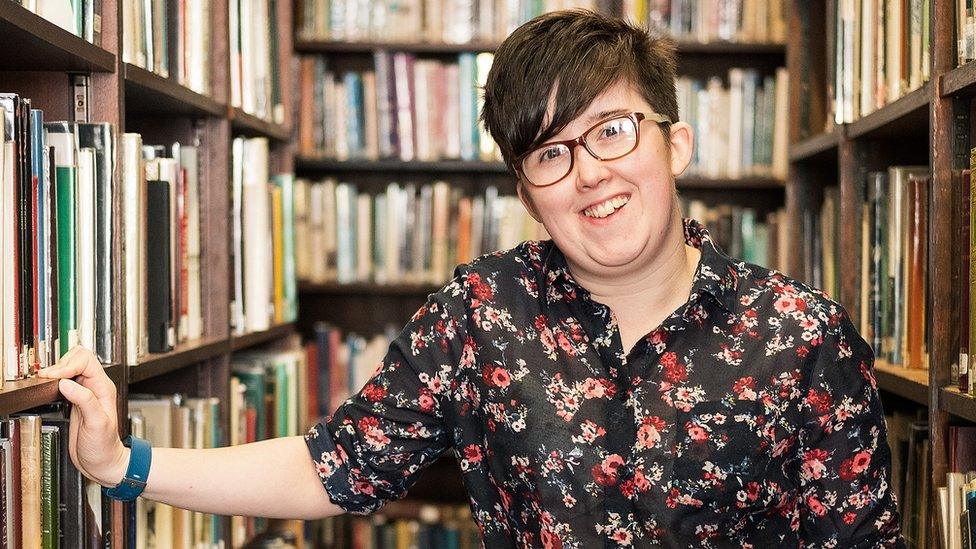Good Friday Agreement: Belfast Glider journey through 'different planet'
- Published
Good Friday Agreement: What's the direction of travel 25 years later?
If the Good Friday Agreement was the start of a journey, what's the direction of travel 25 years later?
We took our own journey between west and east Belfast on a Translink Glider to find out.
Our commuters on the specially named GFA 25 service have been specially selected.
They're part of the so-called peace generation, born after the 1998 Good Friday Agreement.
The Glider has been travelling between the largely nationalist areas of the west to the largely unionist areas of the east every day since 2018.
But during the Troubles, there was no bus that connected those parts of the city. And even if there had been, not many people would have felt safe enough to use it.
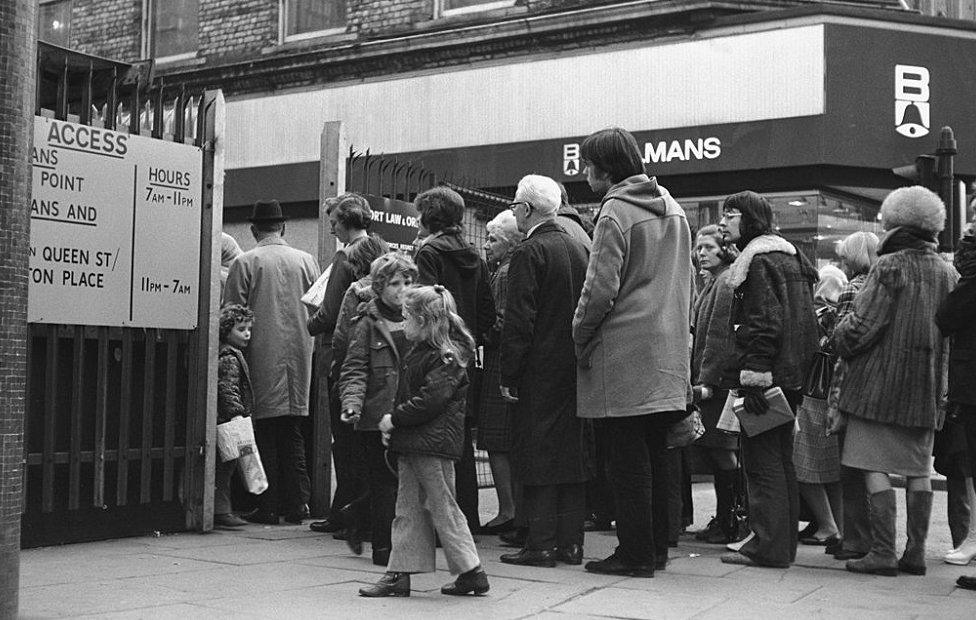
A ring of steel security cordon once surrounded Belfast's city centre
Our journey begins in Belfast city centre with tour guide Paul Donnelly, who is showing our younger passengers pictures of the ring of steel that once surrounded the city's main shopping area.
The huge security cordon was a safety measure put in place in the 1970s in an attempt to stop bombs.
Shoppers had to undergo personal searches and searches of their bags before they could pass through.
"It's insane. It's almost like a different country, like a different planet," said Erin Stacey, from west Belfast.
"For my generation to never have had to experience any shootings, any bombings, any atrocities, that were outcomes from The Troubles - we're very lucky."
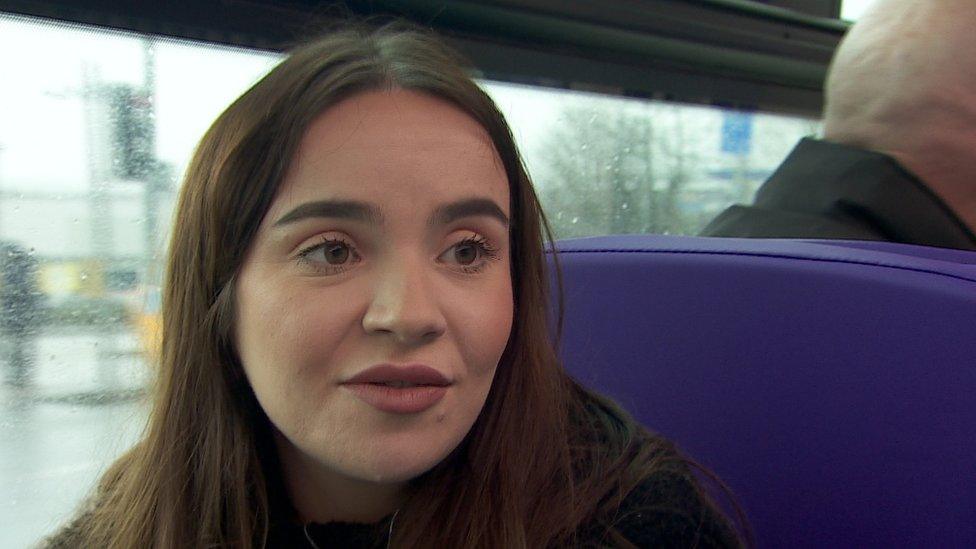
Erin Stacey said young people no longer think about going into each other's areas
"I think the Good Friday Agreement diminished the us versus them mentality that I think our parents' generations would have had.
"Even a journey like this diminishes that as well because we're not thinking about going into each other's areas, it's just one big area and one big community which is what we should be."
As we drive through west Belfast, Liam Groves, who's a local, said: "It's scary, that it was there. But this place has changed.
"We can go into town, we can do what we want. There's festivals on, there's new cinemas opening - there's everything and there's no fear about it. You can just go in, enjoy yourself and there's no worrying about who you're going to meet.
"If anything you're intrigued by who you're going to meet."
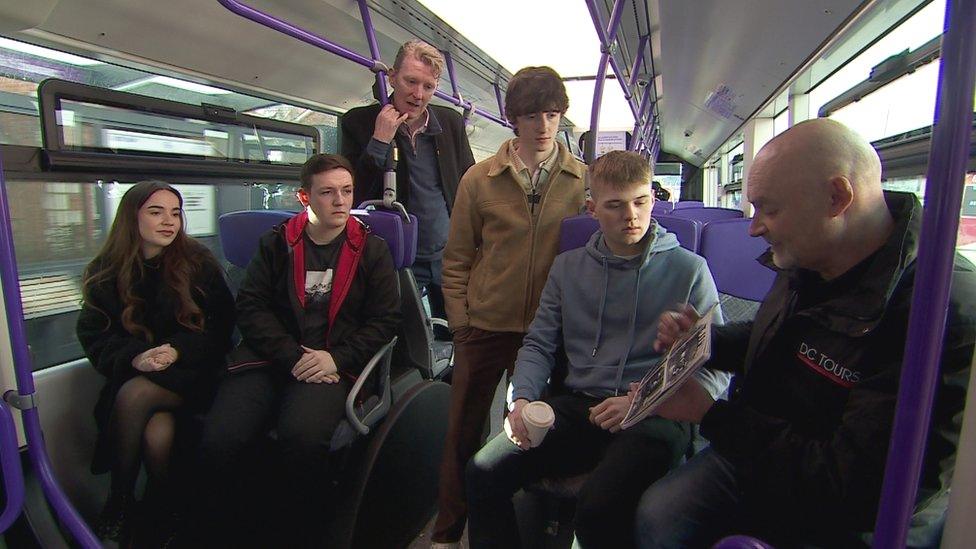
During the Troubles, there was no bus that connected east and west Belfast
As we travel to east Belfast, we speak to Gareth Wright who's from that part of the city. Last summer, he brought two friends from west Belfast to his local Twelfth of July celebrations. In March, he joined them in west Belfast to celebrate St Patrick's Day.
"I've friends in west Belfast, I've friends in south Belfast, obviously quite a lot of friends in east Belfast - I've friends all over the place," he said.
"The Good Friday Agreement anniversary, does it mean much to me? Not really, it doesn't. I know that I'm living in a generation of peace.
"I'm very grateful that I don't have to go into Belfast now and go through steel barricades.
"It's alien for me looking at some of those photographs. It's all free moving for me now."
Joseph Jones, from west Belfast, said: "I've actually never travelled on the Glider from west to east so it's bit different, but I have obviously been to east Belfast.
"It would still be a bit unusual. Belfast, obviously because of our history, is kind of divided into those four areas, so that's probably why as well.
"I know that we're maybe not where we said we'd be - not with a running government as well, so it shows you that we still have a lot to work out.
"But we still have peace, which is a big thing. We can't have everything at once but hopefully at one time, we will."
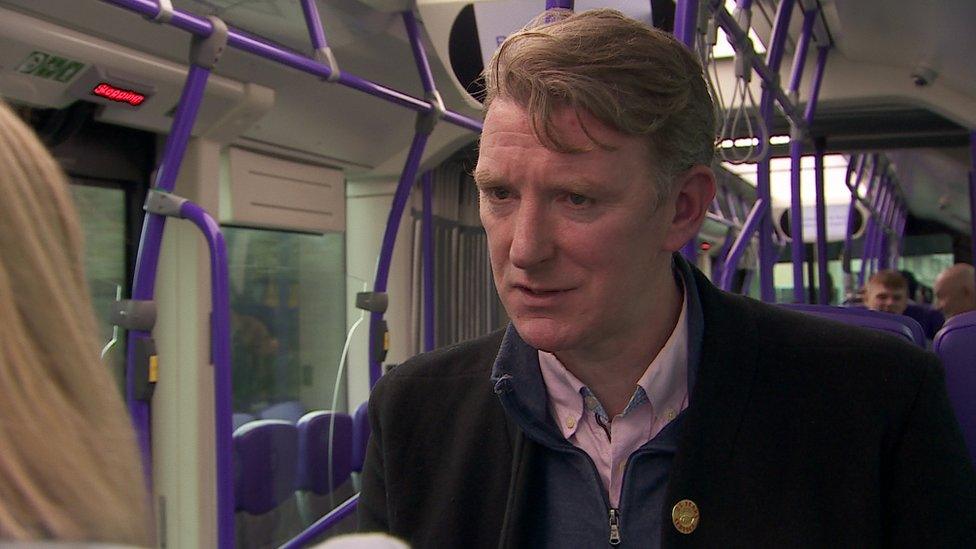
Damian Bannon would never have travelled beyond his district during the Troubles
Damian Bannon joined Translink in 1998, the year the Good Friday Agreement was signed.
"I would never have dreamt of travelling east to west or beyond my district, because you maybe just didn't have the same feeling of safety," he said.
"For my kids now, I'm pleased to say, there's no boundaries.
"The Glider isn't just about connecting people, it's connecting communities. And that's probably an unintended consequence.
"In many ways some people might say it's a symbol of how things have changed. That certainly wouldn't have been a done thing in the past."
Listening on is our tour guide Paul Donnelly, who lives in the east of the city.
"The mobility that people have in saying: 'I'm going to go from Ballybeen in east Belfast or Twinbrook in west Belfast and socialise in downtown Belfast.'
"That's something that was virtually impossible in a fluid way," he said.
"That freedom of movement, that freedom of association, was not part of our lives for a long period of time.
"We still have peace lines, segregated communities, we have a lot of traditional conflict-related troubles, but there are pockets where we see Belfast looking like a city you would recognise elsewhere - certainly in Europe."
He added: "I do have a certain difficulty hearing young people talk about the Good Friday Agreement because they don't really know anything about it.
"Part of me thinks, 'That's a shame because we should acknowledge that period, it was so very important', part of me also thinks there's a good thing there too. They didn't have to go through what we did."
The roots of Northern Ireland’s Troubles lie deep in Irish history
What are NI's plans for the 25th anniversary?
US President Joe Biden, former US President Bill Clinton and ex-secretary of state Hillary Clinton, former UK Prime Minister Tony Blair and former Taoiseach (Irish prime minister) Bertie Ahern are among those expected to visit Northern Ireland for commemorative events.
Both Queen's University Belfast and Ulster University (UU) are hosting events to mark the anniversary.
Large, silent video portraits of 14 of the politicians who negotiated the peace deal will be displayed at UU's Belfast campus from 15 to 20 April.
The university is also launching a new leadership programme, a tourism summit and an education project based on journalist Lyra McKee's legacy.

Declan Harvey and Tara Mills explore the text of the Good Friday Agreement, scrutinising the deal's wording and hearing from some of the people who helped get it across the line.
Click here to listen on BBC Sounds.

Related topics
- Published3 April 2023
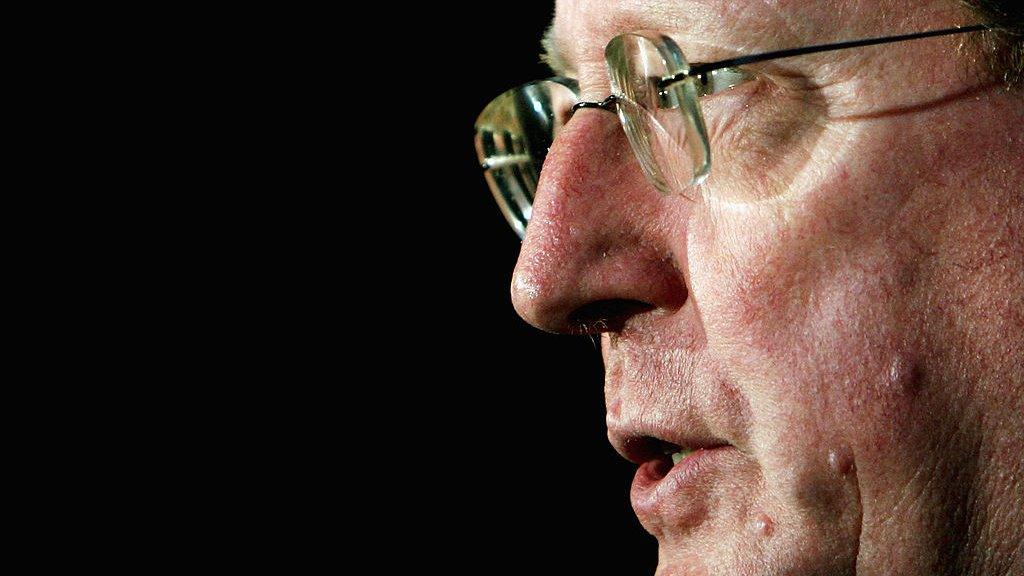
- Published28 March 2023
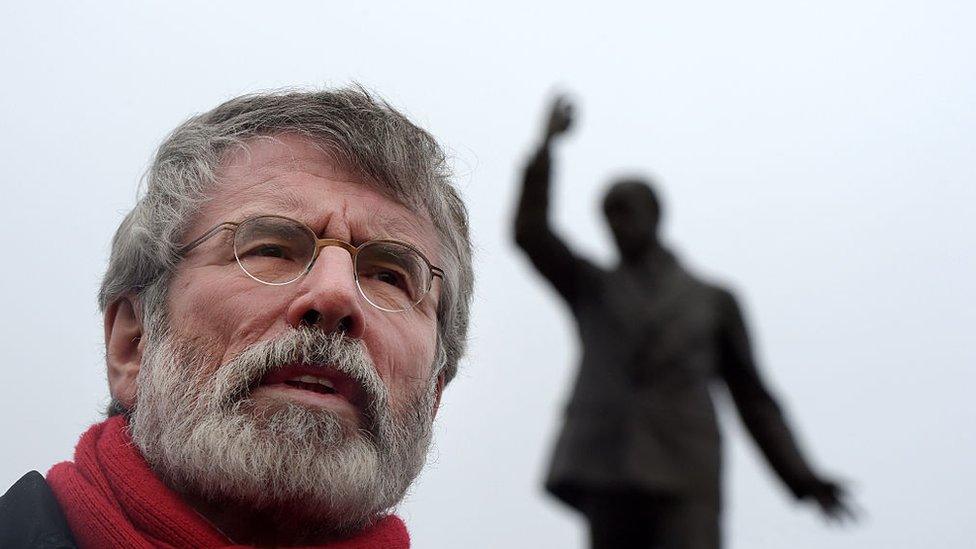
- Published9 March 2023
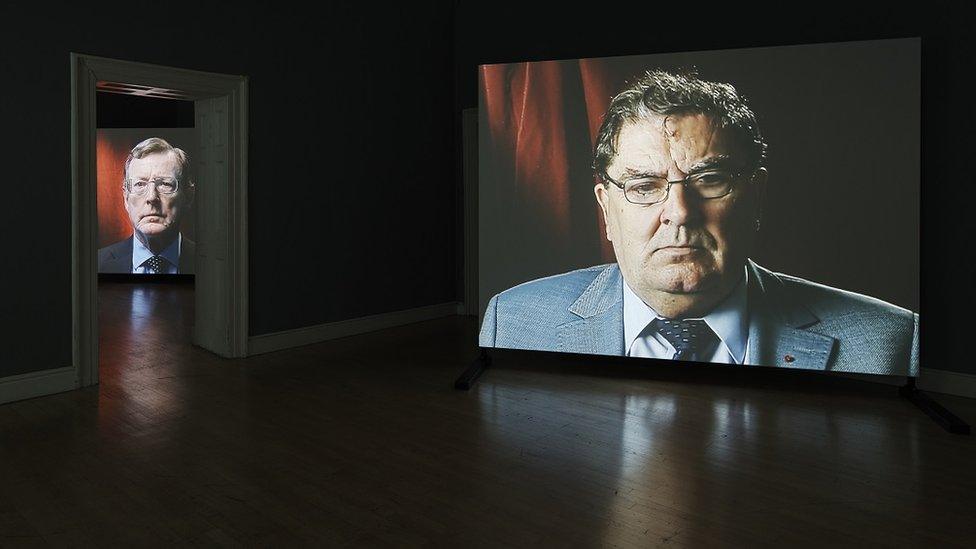
- Published31 December 2021
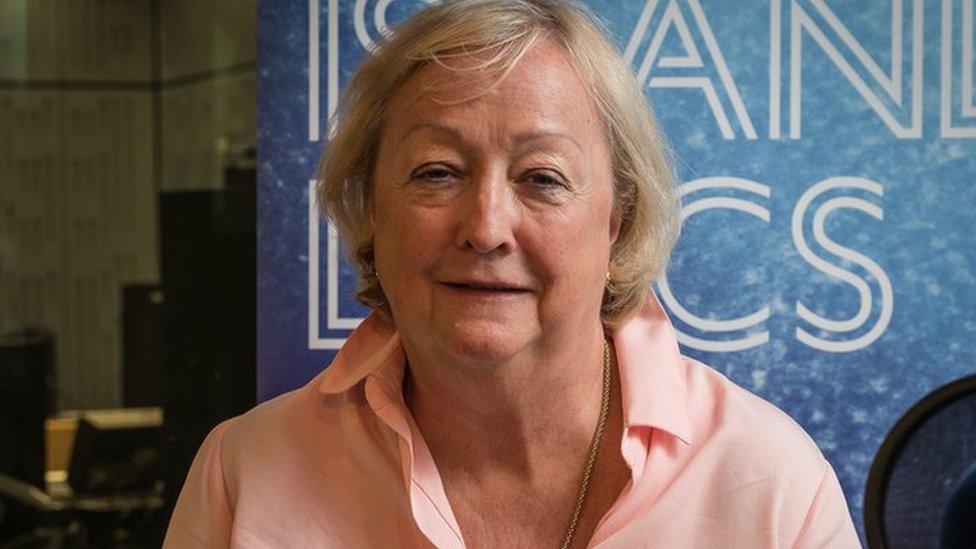
- Published19 April 2019
